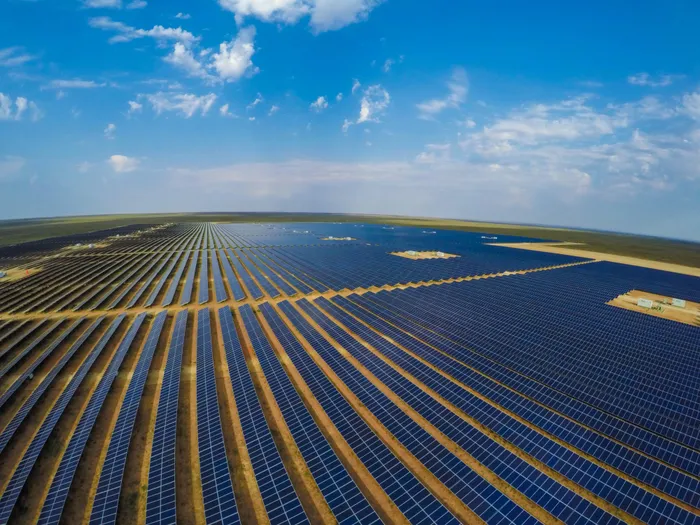South Africa’s 2035 climate action targets: towards ambition, resilience and justice

The PCC believes that 2035 emissions range should be consistent with our fair share of the global effort and aligned with keeping warming well below 2°C. This will require Investment in renewable energy infrastructure.
Image: Supplied
The Just Transition is central to South Africa’s nationally determined contribution (NDC). Key planning instruments - such as economic diversification, labour market readiness, social support, governance, and climate finance - must drive the transition in ways that actively reduce structural inequalities linked to race, gender, geography and economic access. This means not only decarbonising high-emitting sectors but also introducing new sectors and deploying infrastructure that will open opportunities for employment, innovation, and inclusion.
The Department of Forestry, Fisheries and Environment (DFFE) has released the draft NDC for public consultation, signalling government’s recognition that climate action while the Presidential Climate Commission (PCC) released its discussion documents for the NDC, emerging and shaped by months of technical research and wide-ranging stakeholder consultations.
South Africa has revised its NDC 2023-2025, which is the backbone of our climate commitments under the Paris Agreement. This is not merely a compliance exercise to meet international obligations. It is a chance to redefine our development pathway, reaffirm our commitment to justice, and ensure that South Africa charts a bold, inclusive course towards a low-carbon, climate-resilient future.
Setting an NDC requires inclusive and whole of society engagement and consultation, better integration across government departments, and alignment with Sectoral Emissions Targets. The NDC should reflect strategic choices made through the processes established in the Climate Change Act, including the national GHG trajectory, SETs, carbon budgets, and mitigation plans. For this reason, it is critical that all stakeholders and all spheres of government are actively involved in shaping and implementing these commitments
An NDC is more than a set of numbers.
At home, the NDC is the bridge between climate policy and everyday life. Our climate targets need to be rooted in the principles of procedural, distributive, and restorative justice. These principles remind us that climate action means people have a say in shaping climate policy, and that the costs and benefits of the transition are shared fairly, particularly for vulnerable workers and communities, it equally calls on us to heal historical imbalances, ensuring that communities not only endure the transition but thrive in it.
One of the toughest questions is: how ambitious should South Africa be? Too slow a transition and we risk trade restrictions, capital flight, and escalating climate damages. Too fast, and we risk energy insecurity and job losses in vulnerable sectors.
The updated NDC should reflect South Africa’s evolving climate governance landscape, it must take into account the pace and affordability of the transition considering energy security and sustainable economic growth. The PCC accepts that you can transition too fast, but you can also transition too slowly, both cases having significant but different economic and social impacts. However, managed correctly the NDC does present an opportunity to decarbonise existing sectors, gradually phase out sectors that will cease to be more competitive and also introduce sectors that will create opportunities for employment.
The power sector is recognised to be central to achieving 2035 economy-wide emissions reduction due to its high contribution to national emissions and the relative ease of achieving emission reductions at little to no additional cost. For a clear and coherent policy position on climate and electricity policy, it is critical that there is alignment between the primary policy and planning documents in each area; the IRP and South Africa’s NDC.
The DFFE must be commended as the new NDC makes clear that adaptation is not secondary but central, because resilience in water, food systems, health, and infrastructure underpin every other development goal.
The PCC believes that 2035 emissions range should be consistent with our fair share of the global effort and aligned with keeping warming well below 2°C. This strikes a careful balance, which is ambitious enough to meet science and fairness tests, yet mindful of our developmental needs. This will require Investment in renewable energy infrastructure, grid upgrades, and storage to ensure energy security and our developmental needs. The direct investment in electricity infrastructure will create jobs and contribute towards GDP growth.
Moreover, green industrialisation and economic diversification should be prioritised through the development of green technology value chains. There are several upsides to a green industrial economy, including GDP growth, employment and the opportunity to tackle inequality.
The means of implementation must be strengthened through the integration of climate finance into South Africa’s Medium-Term Expenditure Framework, mobilisation of international concessional finance, and operationalisation of domestic instruments such as the Just Transition Financing Mechanism and the Climate Change Response Fund.
To ensure a credible transition, the PCC urges the realisation of the planning instruments for a just transition: labour market reform and skilling/re-skilling mechanisms, industrialisation and economic diversification, social support for displaced worker, enabling governance and regulatory roles for all spheres of government, and facilitating an environment that enables the flow of climate finance.

Blessing Manale is the head of Communications and Outreach at the Presidential Climate Commission.
Image: Supplied
Blessing Manale is Executive, Communications & Consensus Building, Presidential Climate Commission
*** The views expressed here do not necessarily represent those of Independent Media or IOL
BUSINESS REPORT

Blessing Manale is the head of Communications and Outreach at the Presidential Climate Commission.
Image: Supplied